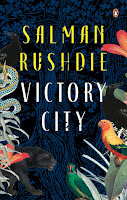Silent House
Orhan Pamuk
 It is a narrative of a week in Cenethissar, a small town near Istanbul. A week when Fatma’s 3 grandchildren come visiting her in her old house in a once-a-year ritual. Fatma is old, bitter, cranky, a Miss Havisham-like recluse, lost in her memories. Recep is her Man Friday, living in the basement, a dwarf who is also Fatma’s husband’s bastard child from a maid servant, a secret Fatma is at pains to keep from her grand children. Faruk is the eldest grandchild, a historian, trying to work at a book whose plot and structure keep eluding him, drowning his existential angst in alcohol. Nilgun is his pretty, left-leaning, book-loving sister, a character we don’t quite grasp, almost left as a prop to further the plot along. Metin is the youngest grandchild, ambitious, dreaming of making it big in America, in with a rich, young crowd, chafing against the family’s relative poverty. And finally there is Hasan, Recep’s nephew, with memories of playing with Faruk, Nilgun and Metin, yet now grown far apart especially in political ideology - running around with the Islamic fundamentalist crowd, learning to hate the communists and the western fascists.
It is a narrative of a week in Cenethissar, a small town near Istanbul. A week when Fatma’s 3 grandchildren come visiting her in her old house in a once-a-year ritual. Fatma is old, bitter, cranky, a Miss Havisham-like recluse, lost in her memories. Recep is her Man Friday, living in the basement, a dwarf who is also Fatma’s husband’s bastard child from a maid servant, a secret Fatma is at pains to keep from her grand children. Faruk is the eldest grandchild, a historian, trying to work at a book whose plot and structure keep eluding him, drowning his existential angst in alcohol. Nilgun is his pretty, left-leaning, book-loving sister, a character we don’t quite grasp, almost left as a prop to further the plot along. Metin is the youngest grandchild, ambitious, dreaming of making it big in America, in with a rich, young crowd, chafing against the family’s relative poverty. And finally there is Hasan, Recep’s nephew, with memories of playing with Faruk, Nilgun and Metin, yet now grown far apart especially in political ideology - running around with the Islamic fundamentalist crowd, learning to hate the communists and the western fascists.
The book is a series of internal monologues of five of these characters - Fatma, Faruk, Metin, Hasan and Recep. In a very stream-of-consciousness sort of way, each of these monologues tries to make the characters real, allowing them a less caricature-ish feel. Because caricatures they definitely are - the Islamic fundamentalist, the well-meaning communist, the western liberal historian, the awed-by-America young man. The characters represent each of the warring factions in a Turkey poised for a coup. The monologues try and make their stories personal, stories of real people living in history-making times. Fatma is the central figure though - suspicious of everyone around her, especially of Recep, without whom she would be lost, still fighting her dead doctor-husband’s atheistic views, remembering how her husband brought their once well-off family to ruin with his money-sucking plans to bring ‘superior’ western philosophy and science to conservative Turkey., drinking his way to death as he realizes his plans may never bear fruit, stuck with a wife who would never understand him. Fatma’s story is probably emblematic of Turkey itself - of age old civilization fighting a more modern world view, fighting to keep a still-relevant past alive at a time when it is under attack from different directions.
The failure of the book though, is really the failure of these monologues. They drag and turn boring after a while. The characters are too pat, too stereotypical. And other than possibly Recep, there is no one who really garners a reader’s sympathy. This is one of Orhan Pamuk’s earliest works - and it is definitely not one that makes you want to read more of him. Having read My Name is Red, one knows he is capable of so much more.




